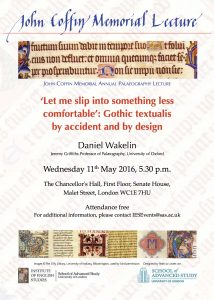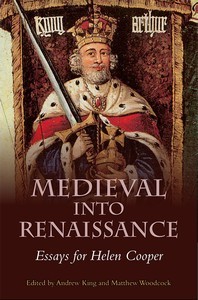A message from the Colloquium Secretary of The London Medieval Society:
Dear Colleagues, Members, and Friends,
Please would you kindly note that our next Colloquium is just a week away – on Saturday 27th February 11-6 on ‘Treasure in the Middle Ages’. We are excited to welcome our speakers: Jenny Stratford(IHR) on treasure inventories, John Clark (MOL) on treasures of the Thames, Kirstin Kennedy (V&A) on treasure hoards, and Emily Guerry (Kent) on Sainte Chapelle. As I mentioned on the programme, this Colloquium springs from our 70th Anniversary Conference last May when archaeologists, curators, historians, and medieval literature experts came together to discuss medieval London in a most fruitful collaboration. This Colloquium will probe medieval attitudes to treasure and how we consider and care about medieval material culture today to debate and question medieval and modern perceptions of treasure, whether relic, ritual or royal object, and hoarded, lauded or rubbished.
We also have some exciting news about the Society to share and a report by Jon-Marc Grussenmayer on the Anniversary Conference.
We are very keen to encourage postgraduate students to attend. The Colloquium is only £5 for students (and concessions) and £10 for waged people and includes tea and coffee and a wine reception afterwards.
The venue is the Old Anatomy Building in QMUL Charterhouse Square EC1M 6BQ (nearest tube: Barbican). The directions are as follows: with your back to the only exit of this tube station turn left and take the first turning left, walk past the Tesco Metro, into Carthusian Street, cross over this street and bear right as it opens into the Square, walk past the glorious Art Deco apartment block and you will see the wrought iron gates ahead of you, walk through the side entrance and the Old Anatomy Building is immediately on your right, the walk takes about four to five minutes from the tube.
May I request also, if you have not already done so, that you kindly reserve a seat via Eventbrite:
https://www.eventbrite.co.uk/e/treasure-in-the-middle-ages-london-medieval-society-tickets-19078786163.
If you have any problems booking please contact me via this email address: deh4@kent.ac.uk – and I shall be delighted to make the reservation for you.
I look forward to welcoming you to Charterhouse Square on 27th February. If you would like to eat supper with us please email me (deh4@kent.ac.uk) and I shall book a nearby Italian trattoria for an early meal.
Best wishes,
Diane
Dr Diane Heath
Assistant Lecturer
Centre for Medieval and Early Modern Studies (MEMS)
Rutherford College, University of Kent
Canterbury, Kent CT2 7NX
Colloquium Secretary, The London Medieval Society
http://londonmedievalsociety.com/
 el Wakelin (Jeremy Griffiths Professor of Medieval English Palaeography, University of Oxford): ‘Let me slip into something less comfortable’: Gothic/Textualis/by Accident and by Design
el Wakelin (Jeremy Griffiths Professor of Medieval English Palaeography, University of Oxford): ‘Let me slip into something less comfortable’: Gothic/Textualis/by Accident and by Design